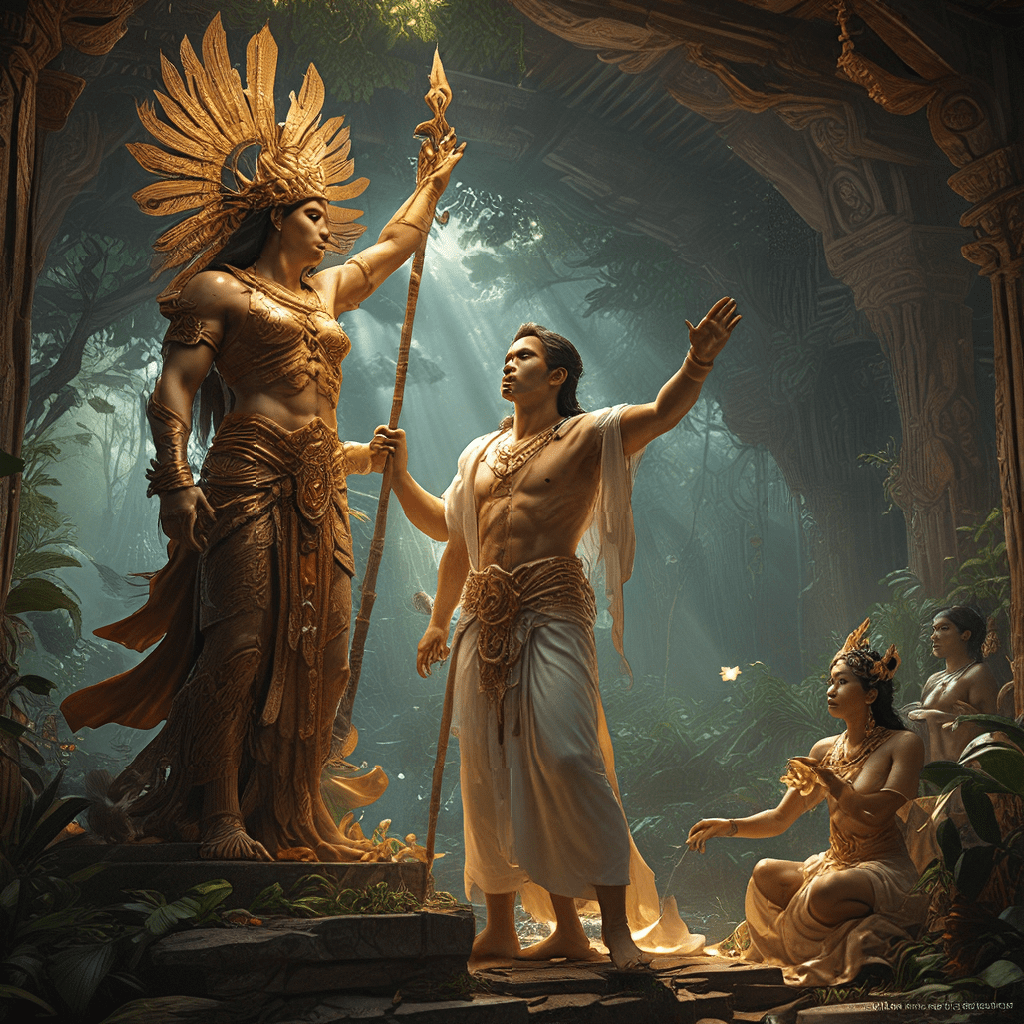Filipino Mythology: A World of Dreams and Spirits
The Philippines, an archipelago of over 7,000 islands, is rich in vibrant mythology and folklore. From the towering mountains to the vast ocean depths, the Filipino people have woven intricate tales about spirits, gods, and mythical creatures that shape their beliefs and traditions. Deeply intertwined with these beliefs is the profound significance of dreams, seen as a window into the spirit world and a source of guidance and wisdom.
Dreams in Filipino culture hold a special place, revered as sacred messages from the ancestors, spirits, and deities. These dreams are not merely fleeting visions of the night but are believed to hold profound meaning, offering glimpses into the unseen world and influencing decisions, actions, and even the course of one's life. They serve as a bridge between the physical world and the spiritual realm, a realm where the boundaries between reality and dreams blur, and the spirits of the past mingle with the living.
The Role of Dreams in Filipino Culture
In Filipino culture, dreams are more than just nocturnal experiences; they are integral to the fabric of life and a vital part of the collective understanding of the world. Dreams are seen as a form of communication between the living and the dead, a way for the spirits to guide, warn, or even offer blessings to those who are still alive. They are often interpreted as messages from the "anito," the spirits of ancestors, or other supernatural beings, providing insight into the future, revealing hidden truths, or even offering solace in times of sorrow.
The belief in the significance of dreams is deeply rooted in Filipino tradition, passed down through generations in stories, songs, and rituals. Throughout history, Filipinos have looked to dreams for guidance, seeking to understand their meaning and incorporate the wisdom they offer into their daily lives.
Dreams as Portals to the Spirit World
In Filipino mythology, the realm of dreams is often seen as a portal to the "kabilang buhay," the afterlife or spirit world. This mystical realm is inhabited by spirits, ancestors, and deities, who can influence the lives of the living through dreams. The act of dreaming itself is seen as a journey into this spiritual realm, where the boundaries of reality dissolve and the veil between the material and the supernatural grows thin.
As individuals sleep, they are believed to be susceptible to the influence of spirits, who can appear in their dreams, offering messages, warnings, or even guidance on future choices. The spirits may choose to communicate through cryptic symbols, vivid imagery, or even direct conversations, leaving the dreamer to decipher the meaning of their nocturnal encounters.
Common Dream Motifs in Filipino Mythology
Filipino mythology is rich in recurring dream motifs, each carrying its own symbolic meaning and significance. Some common dream motifs include:
- Flying: Often interpreted as a sign of freedom, spiritual ascension, or a journey to the spirit world.
- Water: Symbolizes cleansing, purification, or the vastness of the unknown.
- Animals: Different animals hold specific meanings. For example, a dog in a dream might symbolize loyalty, while a snake might represent danger or transformation.
- Food: Food often represents nourishment, abundance, or hospitality. A dream involving food might symbolize a need for sustenance or a desire for connection.
These motifs, when interpreted within the context of Filipino mythology, provide valuable insight into the dreamer's current state, their relationships with the spirit world, and their place in the larger cosmic order.
Interpreting Dreams: The Anito and the Spirits
The interpretation of dreams in Filipino mythology is often linked to the belief in "anito," the spirits of ancestors who are believed to watch over their descendants. These spirits are believed to communicate with the living through dreams, offering guidance, protection, or warnings.
There are various ways to interpret dreams in Filipino culture. Some people consult "manananggal," individuals believed to have the ability to communicate with the spirit world, while others rely on traditional dream dictionaries or seek guidance from elders who possess knowledge of ancestral wisdom and dream interpretation.
Dream Interpretation and Ritual Practices
In the realm of Filipino mythology, dreams are not just personal experiences; they are often incorporated into rituals and ceremonies. Many communities in the Philippines have traditional practices centered around dream interpretation, seeking to harness the wisdom and guidance offered by the spirit world. These rituals are often performed by spiritual healers, elders, or individuals with a deep understanding of ancestral traditions and the language of dreams.
One common ritual is "pamamanata," where individuals make promises or vows to the spirits in exchange for blessings or favors. These promises can be made based on a dream or vision, with the individual pledging to perform certain actions or offer gifts to the spirits in gratitude for their intervention. Another practice is "panalangin sa panaginip," where individuals pray for guidance and clarity in their dreams, seeking the intervention of the ancestors or other benevolent spirits.
These rituals reflect the deep belief in the power of dreams and the importance of connecting with the spirit world for guidance and support. Through these practices, Filipinos seek to navigate the complexities of life, seeking wisdom from the unseen realm and forging a harmonious relationship between the physical and spiritual worlds.
Dreams as Guidance and Warning
Dreams in Filipino mythology often serve as powerful tools for understanding the present and navigating the future. They can act as a source of valuable guidance, revealing hidden truths, warning against potential dangers, or even foreshadowing future events.
A dream about a lost loved one, for instance, might be interpreted as a sign from the spirit of the deceased, offering comfort or guidance. A dream involving a natural disaster might serve as a premonition, prompting the dreamer to take precautions or make preparations. Dreams about illness or misfortune can also offer valuable insights, encouraging the dreamer to take care of their health or avoid risky situations.
The ability to decipher the meanings of dreams is seen as a vital skill, empowering individuals to make informed decisions and navigate the complexities of life. Dreams offer a valuable perspective, reminding individuals of the interconnectedness of the physical and spiritual worlds and the importance of paying attention to the subtle messages from the unseen realm.
The Influence of Dreams on Storytelling and Folklore
Dreams play a significant role in Filipino storytelling and folklore, shaping narratives and influencing popular myths and legends. Dream experiences often serve as the basis for traditional tales, adding depth and mystique to the stories passed down through generations.
Many Filipino folk tales feature characters who possess the ability to interpret dreams, guiding others through their visions or seeking guidance from the spirit world. These stories often highlight the importance of dreams as a source of knowledge, wisdom, and cultural understanding.
One example is the story of "Maria Makiling," a mythical mountain nymph who appears in dreams to those seeking her favor. Her presence in dreams is often associated with blessings, protection, and fertility, highlighting the powerful connection between dreams and the supernatural.
These stories weave intricate tapestries of dreams, spirits, and the interconnectedness of the natural and spiritual worlds, offering rich insights into Filipino beliefs and cultural values.
Dreams and the Filipino Concept of “Kapwa”
In Filipino culture, the concept of "kapwa" represents a profound sense of shared identity and interconnectedness. This concept is often reflected in the interpretation of dreams, where the dreamer's connection to the spirit world is seen as an extension of their connection to their community and their ancestors.
The interpretation of dreams often involves considering the dreamer's relationships and their role within the community. Dreams about family members, for example, might be interpreted as messages from the spirits of ancestors, offering guidance, support, or warnings to the dreamer and their family.
The shared experience of dreams further strengthens the sense of "kapwa," highlighting the commonality of the human experience and the interconnectedness of all beings. Dreams become a universal language, transcending individual boundaries and fostering a sense of belonging within the larger community.
Modern Interpretations of Dreams in Filipino Culture
While the traditional beliefs about dream interpretation remain influential, modern Filipinos also embrace a broader range of perspectives on the significance of dreams. Some individuals seek guidance from psychotherapists, using dream analysis as a tool for understanding their emotions, resolving conflicts, or gaining insights into their personal journeys.
Others embrace the influence of Western dream dictionaries or online resources, seeking to unravel the symbolism and meaning of their dreams within the framework of universal archetypes and symbolism.
Despite the evolution of cultural influences, the core belief in the significance of dreams remains prevalent in Filipino culture. Dreams are still seen as a powerful source of guidance, wisdom, and connection to the spiritual realm, reflecting the enduring influence of tradition and the enduring magic of the dream world.
FAQ
What are some common dream motifs in Filipino mythology?
Some common dream motifs include flying, which signifies freedom and spiritual ascension; water, symbolizing cleansing and the unknown; animals, each with specific meanings, such as loyalty for dogs and danger for snakes; and food, signifying nourishment, abundance, and connection.
How do Filipinos interpret dreams?
Filipinos interpret dreams through various methods, including consulting with "manananggal," individuals who communicate with spirits; relying on traditional dream dictionaries; or seeking guidance from elders knowledgeable in ancestral wisdom and dream interpretation.
What role do dreams play in Filipino rituals?
Dreams are incorporated into rituals like "pamamanata," where individuals make promises to spirits for blessings, and "panalangin sa panaginip," where they pray for clarity in dreams. These rituals demonstrate the belief in the power of dreams and the importance of connecting with the spirit world for guidance.
How do dreams influence Filipino storytelling and folklore?
Dreams shape narratives, often serving as the basis for traditional tales featuring characters who interpret dreams or seek guidance from the spirit world. These stories highlight the importance of dreams as a source of knowledge, wisdom, and cultural understanding.
How does the concept of “kapwa” relate to dream interpretation?
The concept of "kapwa," emphasizing shared identity and interconnectedness, is reflected in dream interpretation, where the dreamer's connection to the spirit world is seen as an extension of their connection to their community and ancestors.
This shared experience of dreams strengthens the sense of "kapwa," highlighting the commonality of the human experience and the interconnectedness of all beings. Dreams become a universal language, transcending individual boundaries and fostering a sense of belonging within the larger community.


